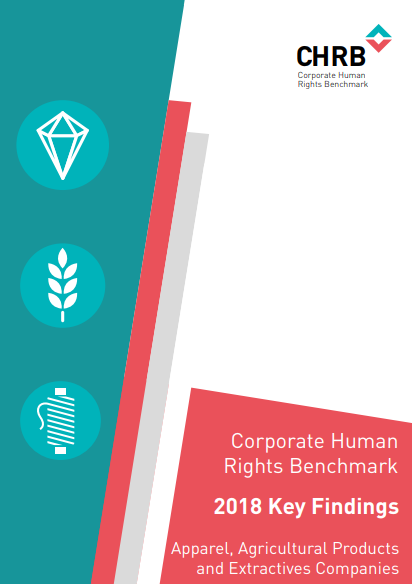Corporate Human Rights Benchmark: Pilot Methodology 2016
The CHRB pilot methodology assessed the top 100 companies across the agricultural products, apparel and extractives industries on their human rights policies, processes and performance.
The 2018 Corporate Human Rights Benchmark assesses 101 of the largest publicly traded companies in the world on a set of human rights indicators. The companies from 3 industries – Agricultural Products, Apparel, and Extractives – were chosen for the first Benchmark on the basis of their size (market capitalisation) and revenues and assessed across 6 Measurement Themes which have different weightings. Even though average scores are low across the board, overall companies tend to perform more strongly on policy commitments and management systems than on remedy or dealing with key risks in practice.

Average scores per region (source: CHRB 2018)
Some key takeaways from the results

The CHRB pilot methodology assessed the top 100 companies across the agricultural products, apparel and extractives industries on their human rights policies, processes and performance.
This Benchmark focuses on 98 companies of the three industries: Agricultural Products, Apparel, and Extractive. It is grounded in the UN Guiding Principles on Business and Human Rights, as well as additional standards and guidance focused on specific industries and...
Garment workers, mostly women, earn some of the lowest wages in the world while making clothes for some of the biggest fashion brands. Romania has about 300,000 oficial garment workers, who usually earn a minimum wage of about 230 EUR after tax. Wor...Read More
This report is the result of a collective effort to pause, look inwards, and reflect on the process of transformative change. It collates a series of insights, challenges, and lessons learnt by and with ten grassroots organisations from Latin Americ...Read More
The data in this report represents signals and cases from January 1, 2018 through December 31, 2018 and is accurate as of July 25, 2019. Cases of trafficking may be ongoing or new information may revealed to the National Hotline over time. Consequen...Read More
The data in this report represents signals and cases from January 1, 2019 through December 31, 2019 and is accurate as of July 30, 2020. Cases of trafficking may be ongoing or new information may revealed to the National Hotline over time. Consequen...Read More